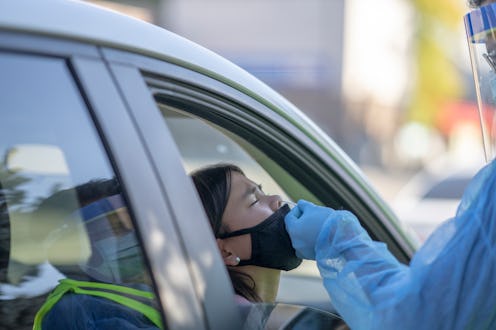Wellness
5 Myths About Coronavirus Rapid Testing, Busted By Doctors
Testing negative does not mean you can stop social distancing.

Go to a testing center, get your nose swabbed, know if you're positive for COVID or not in under 15 minutes. Sounds amazing, right? Rapid tests have proved hugely popular for sussing out COVID-19 infections — but they've also attracted their fair share of misinformation. When it comes to breaking through the myths about coronavirus rapid testing, experts tell Bustle, it's important to know your lingo about tests and protocols.
"COVID-19 testing for an active infection can be done by PCR, which amplifies the virus to detect it, or by antigen, which tests for a piece of the virus on its surface," Dr. Sachin Nagrani M.D., medical director of healthcare providers Heal, tells Bustle. The antigen version is the rapid test, and they can be done very quickly — down to 10 minutes, in some cases, while the PCR tests require results to be obtained from a lab. But there's a reason nobody has switched entirely over to rapid tests; they're part of a bigger testing ecosystem, and doctors are still discovering what kinds of tests work best for what patients. Asymptomatic people, for instance, may need to be checked for COVID-19 in different ways than those showing lots of symptoms.
If you're hearing a lot of different things about rapid tests, what they involve, and how accurate they are, it can be hard to figure out the truth. Here are five myths about rapid testing and how it works, busted.
Myth 1: "Rapid Tests Are Always Accurate"
An October study from University of Arizona researchers that hasn't yet been peer-reviewed found that while rapid tests were very good at discovering coronavirus in people with symptoms, one kind faltered when it came to asymptomatic people. Nearly 2,500 people in the study were tested twice, with both rapid tests and PCR tests. The rapid tests were positive for 80% of coronavirus cases with symptoms, but when it came to people who had COVID and no symptoms at all, it only identified 32% of them. This could mean that rapid tests aren't actually that useful for people who are showing no symptoms. But it could also show something important: that the asymptomatic people who couldn't be detected by rapid tests are no longer contagious.
That isn't a reason not to take a rapid test — just a reason to be careful about interpreting results. "No test is 100% accurate, but the consensus is that rapid testing is not as accurate as gold standard, or molecular tests," Dr. Seema Sarin M.D., director of lifestyle medicine at EHE Health, tells Bustle. "Positive results are highly accurate, but negative results may need to be confirmed with a molecular test." Meaning, if you don't have symptoms and you're considering getting tested as a preventative measure before traveling, for example, you're better off with the regular test.
Myth 2: "Rapid Testing Means You Can Stop Socially Distancing"
A study in JAMA Network in 2020 noted that more widespread rapid testing could mean that people felt more encouraged to ignore social distancing and stop wearing masks — which would not be good.
"Rapid tests provide the benefit of results within minutes, with the tradeoff of potentially missing detection based on how much of the virus is present in a sample," Dr. Nagrani says. Antigen tests measure your viral load, or how much virus there is in your sample. If there's not very much, it might say you're negative, even if you do have the virus. This could also be why it's not as effective for asymptomatic people.
Ultimately, though, testing negative just means you don't have the virus at that moment — you could still get it by having close contact with someone who does. Wearing a mask, consistent hand hygiene, and staying at least six feet apart from others are still the best way to prevent infection.
Myth 3: "All Rapid Tests Are Sent To A Lab Anyway"
You may have heard that the turnaround for rapid tests is still pretty long, but it's not true. "The great thing about rapid test kits is that they can be administered by a trained professional just about anywhere, and do not need to be sent to a lab for analysis," Dr. Seema Sarin M.D., director of lifestyle medicine at EHE Health, tells Bustle. That's why you can get your results so quickly, where as a PCR test might take a few days.
Myth 4: "All Rapid Tests Work The Same Way"
"The samples required for rapid COVID-19 testing differ from one test to the next," Dr. Sarin says. "Right now there are tests that require either a saliva sample, a sample of cells from the respiratory system (for example those gathered via a nasal swab) or a blood sample." Don't be surprised if one friend gets a rapid test involving a needle, while you get a nasal swab tickling the base of your brain. They're just different methods of testing for the same properties.
Myth 5: "You Should Stick To PCR Tests"
So should we all stay away from rapid tests because of the potential pitfalls? "No test is perfect, including the PCR based test, which can also result in false negatives," Dr. Nagrani says. "Rapid tests can be effective for COVID diagnostics when used appropriately." The key takeaway is that COVID-19 testing is evolving, and that rapid tests aren't the solution until we have a vaccine; they're just part of an ecosystem of checks. And if you have any doubt about the results of a rapid test, you should speak to your doctor or testing facility about it.
Experts:
Dr. Sachin Nagrani M.D.
Dr. Seema Sarin M.D.
Studies cited:
Rubin, R. (2020) The Challenges of Expanding Rapid Tests to Curb COVID-19. JAMA. doi:10.1001/jama.2020.21106